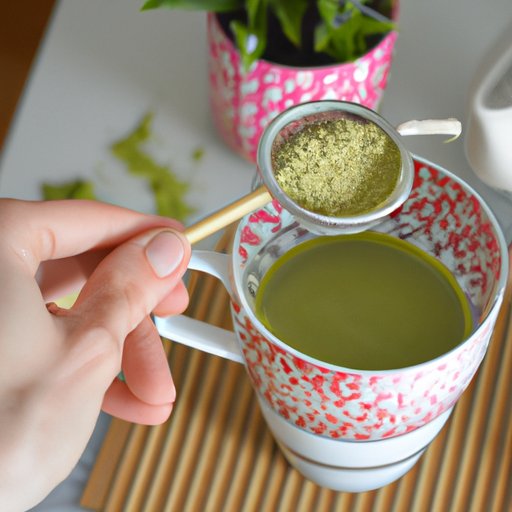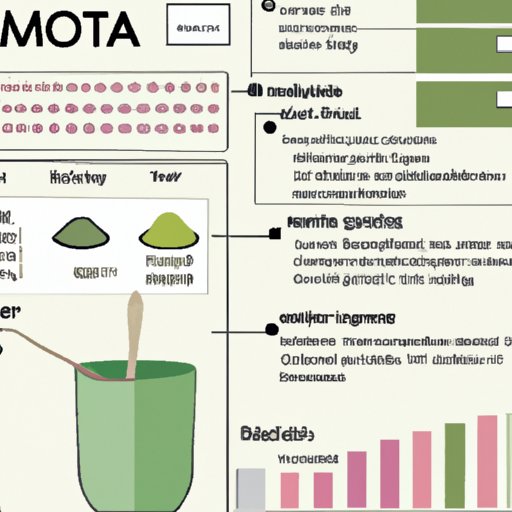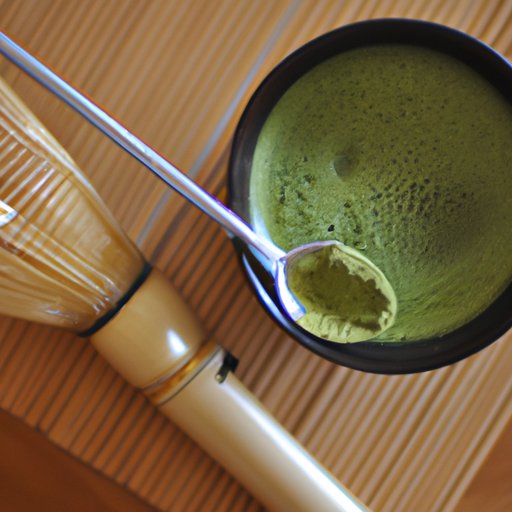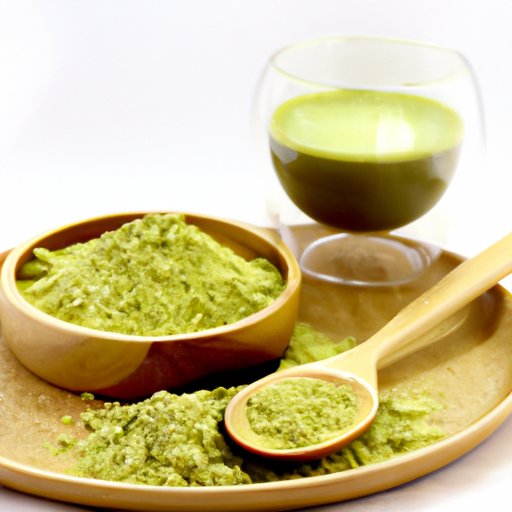Introduction
You may have seen it in cafes, smoothies, teas and even ice cream—matcha is all the rage these days. But what exactly is matcha and why is it so popular? And is it really as healthy as people say it is?
Matcha is a type of green tea made from powdered tea leaves. It has been used in Japanese culture for centuries and is now being embraced by the rest of the world due to its purported health benefits. In this article, we’ll take a look at the evidence-based health benefits of matcha, its nutritional profile and potential side effects.

Exploring the Health Benefits of Matcha Tea
Matcha has been linked to numerous health benefits, including the potential to boost metabolism, support weight loss, enhance mental clarity and focus, and provide powerful antioxidants.
Boosts Metabolism
A study published in the journal Nutrition found that matcha can help boost your metabolism. Participants who drank matcha tea for 12 weeks experienced an increase in energy expenditure and fat oxidation rates compared to those who did not drink matcha tea.
Supports Weight Loss
Matcha contains caffeine, which some studies suggest can help support weight loss efforts. Caffeine has been shown to increase thermogenesis, the process of heat production in the body, which can lead to increased fat burning and promote weight loss.
Enhances Mental Clarity and Focus
Matcha also contains L-theanine, an amino acid that has been linked to improved mental clarity and focus. A study published in the journal Nutritional Neuroscience found that participants who took a combination of caffeine and L-theanine experienced improved alertness, task switching ability and reaction time compared to those who only took caffeine.
Rich in Antioxidants
Matcha is rich in antioxidants, compounds that help protect cells from damage caused by free radicals. According to a study published in the journal Food Chemistry, matcha contains higher levels of antioxidants than other types of green tea.
May Help Lower Cholesterol
Matcha may also help lower cholesterol levels. A study published in the journal Food Science and Technology Research found that participants who consumed matcha tea for 12 weeks experienced significant reductions in total cholesterol and LDL (“bad”) cholesterol levels compared to those who did not drink matcha tea.

Unpacking the Nutritional Profile of Matcha
Matcha is low in calories but high in nutrients like protein, fiber, vitamins, and minerals. Let’s take a closer look at the nutritional profile of matcha:
Calories
One teaspoon of matcha powder contains only 4 calories.
Protein
Matcha contains 1 gram of protein per teaspoon.
Fat
Matcha contains 0 grams of fat per teaspoon.
Fiber
Matcha contains 1 gram of dietary fiber per teaspoon.
Vitamins and Minerals
Matcha is a good source of vitamins and minerals such as vitamin C, zinc, magnesium, and iron. It also contains small amounts of calcium, potassium, phosphorus, and sodium.
Examining Matcha’s Impact on Weight Loss
As mentioned earlier, matcha contains caffeine, which some studies suggest can help support weight loss efforts. But how does the caffeine content of matcha compare to other beverages?
Link Between Caffeine Content and Weight Loss
According to the National Institutes of Health, matcha contains 35-70 mg of caffeine per serving, which is less than coffee (95-200 mg/serving) but more than green tea (15-50 mg/serving). While research suggests that caffeine can help support weight loss efforts, it is important to note that consuming too much caffeine can be harmful.
Possible Benefits of Matcha for Appetite Control
In addition to its caffeine content, matcha may also help with appetite control. A study published in the journal Appetite found that participants who consumed matcha tea experienced reduced hunger and increased satiety compared to those who did not consume matcha tea.
A Scientific Look at Matcha’s Antioxidant Content
Matcha is packed with antioxidants, which are compounds that help protect cells from damage caused by free radicals. Let’s take a closer look at the science behind matcha’s antioxidant content.
Definition of Antioxidants
Antioxidants are molecules that can neutralize free radicals, unstable molecules that can damage cells and contribute to the development of chronic diseases. Antioxidants can be found in a variety of foods and drinks, including fruits, vegetables, nuts, and tea.
Benefits of High Antioxidant Content
Studies suggest that consuming foods and beverages with high levels of antioxidants can help reduce inflammation, protect against oxidative stress, and improve overall health. Matcha is especially rich in antioxidants, making it an excellent choice for those looking to increase their intake.
Comparing Matcha to Other Green Teas
It’s important to note that not all green teas are created equal. Matcha differs from other types of green tea in several ways.
Differences in Processing
The biggest difference between matcha and other green teas is the way it is processed. Unlike other green teas, which are steeped in hot water, matcha is ground into a fine powder and mixed with hot water. This allows you to consume the entire leaf, rather than just the brewed water.
Caffeine Content
Matcha tends to have a higher caffeine content than other types of green tea. As mentioned earlier, matcha contains 35-70 mg of caffeine per serving, while other green teas typically contain 15-50 mg of caffeine per serving.
Antioxidant Levels
Matcha is also higher in antioxidants than other green teas. According to a study published in the journal Food Chemistry, matcha contains higher levels of antioxidants than other types of green tea.
The Potential Side Effects of Matcha Consumption
While matcha has many health benefits, there are a few potential side effects to consider before consuming it.
Risk of Heavy Metal Contamination
Due to its powdered form, matcha can be contaminated with heavy metals such as arsenic, lead, and mercury. It’s important to buy matcha from a reputable source to minimize your risk of contamination.
Caffeine-Related Side Effects
Since matcha contains caffeine, it can cause side effects such as insomnia, nervousness, headaches, and irritability. To avoid these side effects, limit your intake to one or two cups per day.

Evaluating Matcha as an Overall Healthy Choice
So, is matcha healthy? The answer is yes—matcha has numerous health benefits and is packed with antioxidants, vitamins, and minerals. However, it is important to keep in mind that matcha contains caffeine and may be contaminated with heavy metals if not sourced properly.
Summary of Health Benefits
Matcha is linked to numerous health benefits, including the potential to boost metabolism, support weight loss, enhance mental clarity and focus, and provide powerful antioxidants.
Considerations for Safe Consumption
It is important to limit your intake of matcha to one or two cups per day to avoid caffeine-related side effects. Additionally, make sure to buy matcha from a reputable source to minimize your risk of heavy metal contamination.
Final Thoughts
Overall, matcha is a healthy choice for those looking to increase their intake of antioxidants and other beneficial compounds. When consumed in moderation and sourced properly, matcha can be a great addition to your diet.
Conclusion
Matcha is a type of green tea made from powdered tea leaves. It has been linked to numerous health benefits, including the potential to boost metabolism, support weight loss, enhance mental clarity and focus, and provide powerful antioxidants. Matcha is also low in calories and high in nutrients like protein, fiber, vitamins, and minerals. However, it is important to keep in mind that matcha contains caffeine and may be contaminated with heavy metals if not sourced properly. When consumed in moderation and sourced properly, matcha can be a great addition to your diet.
(Note: Is this article not meeting your expectations? Do you have knowledge or insights to share? Unlock new opportunities and expand your reach by joining our authors team. Click Registration to join us and share your expertise with our readers.)
